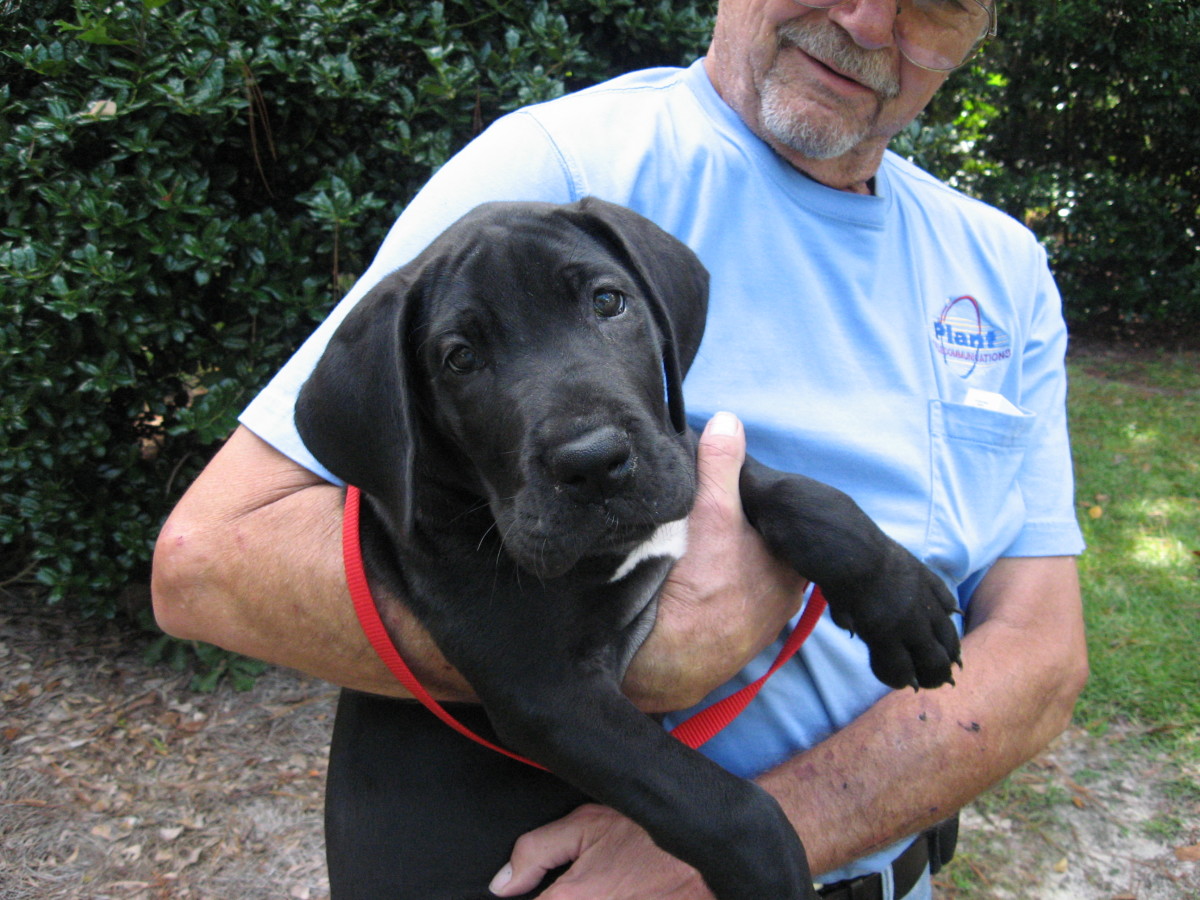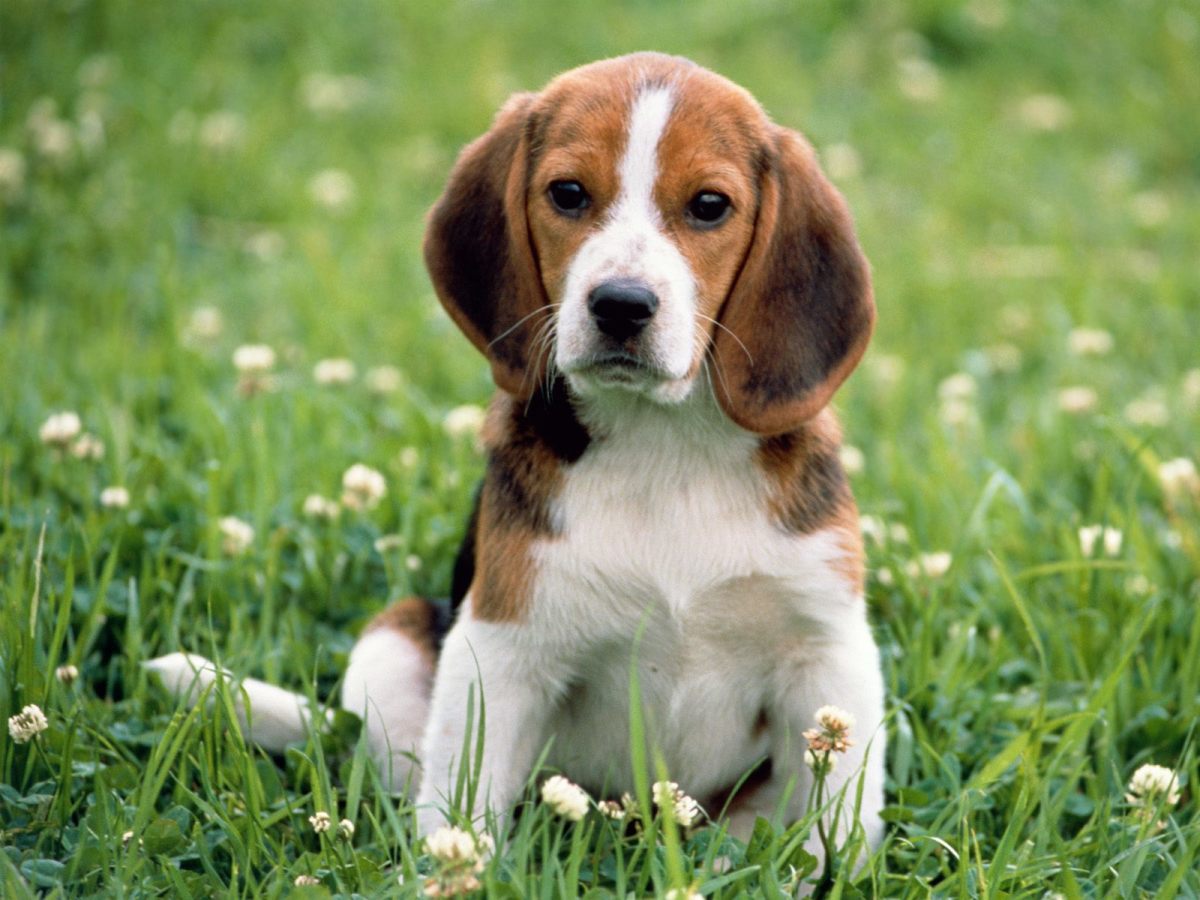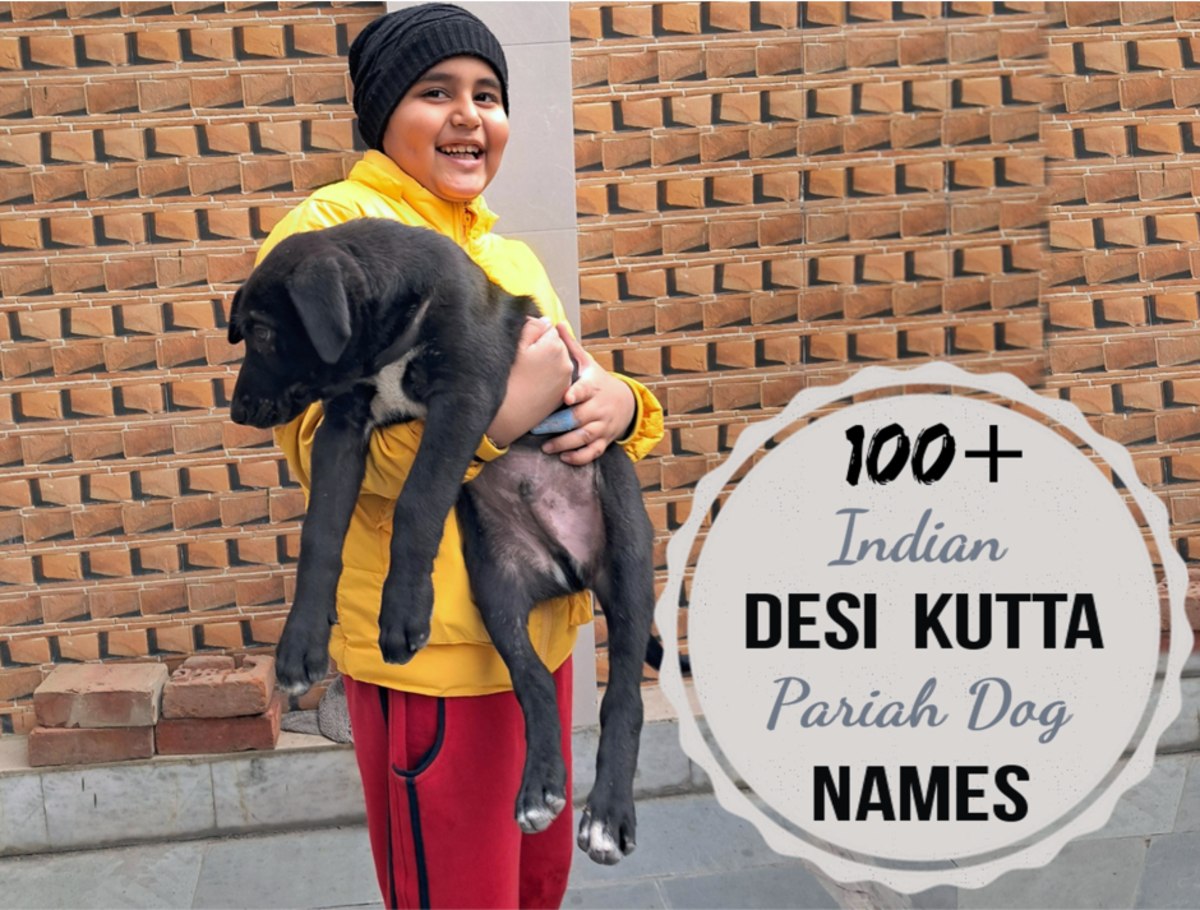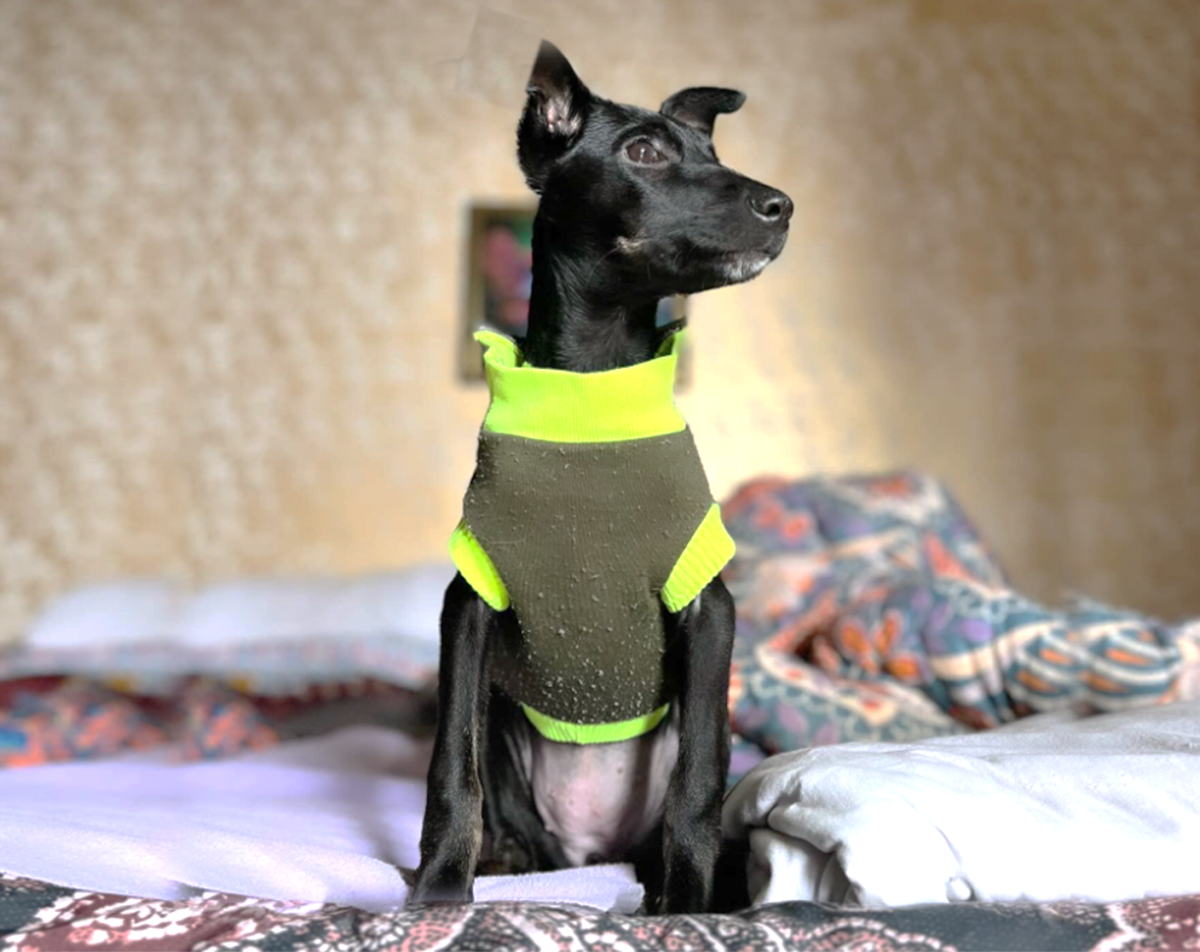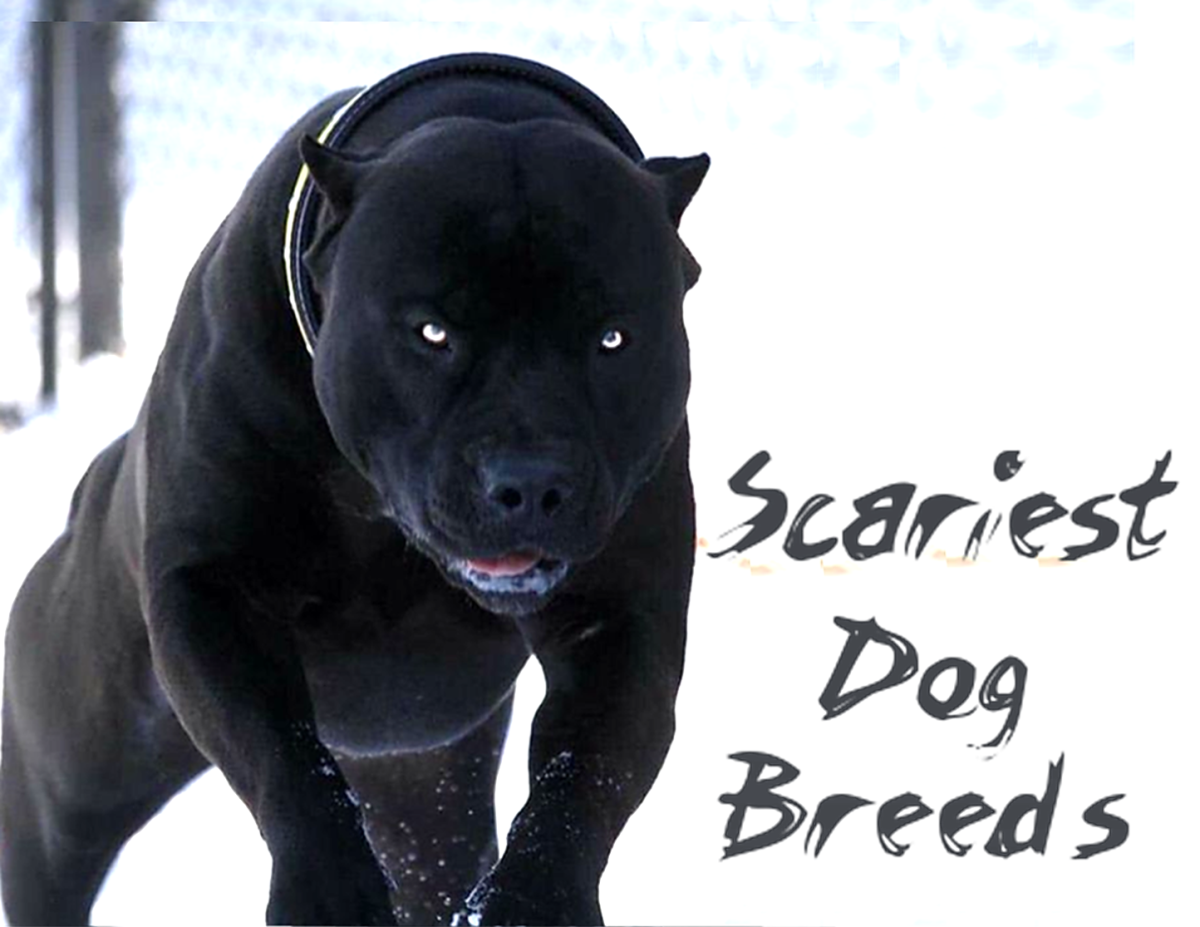How To Train Your Puppy

Puppy Trouble - If I Only Knew Then What I Know Now
The first month we had our Rhodesian Ridgeback rescue puppy, Chase, he ate my dinner off the stove and locked me out of the house. It was cold that night!. He also got his foot stuck in his crate. We had to cut him out with wire cutters. And, he regularly knocked down the dog barrier in the car to sit in the front seat. And that was just the first month! It's hard having a dog who is smarter than you are.
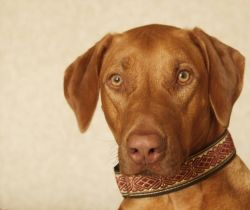
Train or Be Trained
Chase was nothing like my last dogs - they were geriatric English mastiffs. Chase had energy to spare and was a great problem solver. I knew I had to get this puppy trained fast or life in my house was never going to be the same. From the Rhodesian Ridgeback Club of the United States web site, "many people are just not prepared for the stubborness and hard-headedness in this breed." But I had to wonder whether what I was seeing was stubbornness. It just seemed like he did what worked, what got him what he wanted. That's not necessarily a bad thing unless you and the dog want very different things. How could I get Chase to want the same things I wanted?

It's Not The Dog, It's The Method
When I finally got down to training Chase, I used a method called clicker training. Even though the science behind this type of training has been around for decades, compared to other force based training methods, it's relatively new. And do you know what? Dogs and puppies love it! And, when puppies grow up with clear communication, it makes them very easy to train. It's exactly the way to get them to "want what you want" and have fun doing it.
Does He Look Stubborn To You?
Chase is the one with the red nose, dusting the coffee table, an advanced trick. Does he look "stubborn and hard-headed?"
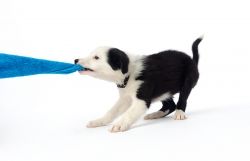
Don't Talk So Much!
The first thing I learned was to shut up and let the clicker do the talking. Despite what Disney would have you believe, there is no great exchange of communication when you talk to your dog ("What? TImmy fell in the well? I'll be right there."). Yes, your dog can read your body language and he can tell if the "good witch" or the "bad witch" is sitting on your shoulder by your tone of voice. But, when you try and teach him new things, words just slow things down. When you realize that, training happens so much faster.
The Power of a Marker
You're probably wondering, "if I can't teach my dog by talking to him, what am I supposed to do?" You can do what the Navy does when they want to teach dolphins open ocean defense work (where they are free to swim away forever). You can do what zoo keepers do when they want to teach animals to participate in their own care. Use marker training. A marker is a sound that marks the moment the animal does something we'd like to see repeated. Clickers and whistles are commonly used in dog training. We also use words (verbal marker), mouth sounds and in some cases, hand signals, light flashes and more. We pair the marker we're using with food and voila - instant communication that's clear to both the trainer and the trainee, whether the trainee is a puppy, dophin, elephant or gorilla.
Listen closely for the sound of the click as the gorilla puts his arm in the sleeve and stays quiet as his blood pressure is taken. He's not being stubborn or hard headed at all, even though no one could safely force him to do this if he were conscious. He seems to think it's pretty cool, or at least worth his while.
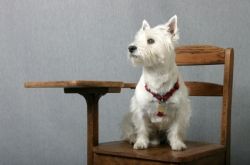
Skeptical? See Puppy Training Videos
In the following videos, puppies are learning a variety of life skills which include - sitting and looking at their owner when there is something they want, sitting to meet people instead of jumping, looking away from a distraction (food or toy) and focusing on their owner instead, and being called away from a distraction. These puppies learned these skills off-leash in a safe environment, with the ability to make choices about what they did. You can see what their choices were.
Food, Toys and the Crate
Puppy Learns to Sit Instead of Jump and To Come
This video includes some of Cassie's first training session. Does your puppy have this much fun when she learns?
16 Week Old Puppy Comes When Called
Play Training - Using Play as a Reward
See What This Puppy Thinks About Training

Learning Shouldn't Hurt
The good news is that with modern training methods that aren't based on fear and avoidance, you can train very young puppies. You can even train some pretty complex behavior to young puppies. Dogs and puppies enjoy learning and look forward to training and working with you. The bad news is you lose your excuse for why your dog or puppy doesn't behave. Sorry, but it's the truth.
With this type of training, the responsibility for the behavior falls to the teacher, not the student. It's our responsibility to teach the puppy or dog how to learn the rules of polite behavior and live in human society. No more calling the dog names like stubborn and hard-headed. When we become better teachers, our students become better learners. As one of my students said, "Every dog is a genius when their human trains them correctly."
Enough Already About The Food
People who are opposed to food reward training don't understand how it works. Often they'll say, "I tried it but it didn't work." (Tell that to the gorilla.) But if they haven't studied or mastered it, they shouldn't dissuade you from trying it.
But honestly, there are a few easy ways to do it wrong.
- If the person says, "If you use food, your dog will only obey if you have food with you," that means they made mistake #1. If they don't know the basics, a person could absolutely train their dog or puppy to respond only if they had food on them. We call that "operator error," and there's an easy fix. That's why it's important to find the right teacher.
- Another common criticism is from the person who says their dog "isn't food motivated." That's mistake #2. A dog who doesn't eat would be dead. Usually the people who say this are trying to train their dogs in situations in which they are too scared to accept food. A lot less pressure and maybe a little shopping around for the perfect treat, and that problem is solved. The rare dog that doesn't really enjoy working for food (and don't assume you have this dog unless you have worked with an expert first) will probably love to work for other things like play and toys.
- Finally, you'll hear, "Clicker trained dogs all get fat." This #3 is the funniest of all. Do you feed your dog at all? Their meals often make great training food. And we have the power to control our dogs' food intake, so it is easy to adjust the calories if we give them something a little fancier for a complicated training session.
Find a Clicker Trainer Near You, But Buyer Beware
Not everyone who uses a clicker believes learning shouldn't hurt. So just because they say they use a clicker or are "positive" trainers doesn't mean they won't hurt your dog. So sometimes you need to go beyond the headline on the website or title of the business card.
The good news is that good clicker trainers are everywhere. You can start by visiting the Karen Pryor Academy web site. Another good resource is the Certification Council for Professional Dog Trainers. Not all members of this organization are clicker trainers, but they've been independently tested on their understanding of behavioral science, among other things. I recommend you ask to observe a class to see the trainer's skill and teaching style. There is no force used in clicker training. Puppies and dogs should be relaxed, comfortable and enjoy learning.
No one near you? Check out clicker training tutorials on YouTube and join some Yahoo groups to discuss it with more experienced folks.
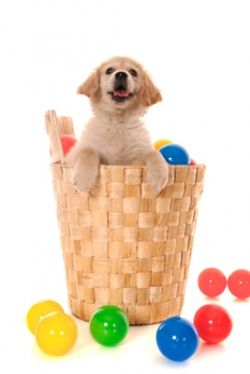
The Clock Is Ticking
There's one more piece of your puppy's education. It's the most important piece. It's socialization. We've learned that there is a critical period in your puppy's behavioral development. During this period, he's more likely to approach things that scare him. That's when you can help him learn that all sorts of things in the typical human life are OK.
According to "Puppy Start Right: Foundation Training for the Companion Dog," "It is the most influential learning period of a dog's life, forming the foundation for all future learning." This period can start around 3 weeks and last up until 12-16 weeks of age. Socialization is so critically important to your puppy's behavioral development that Dr. Lisa Radosta refers to it as "The Magic Pill." You can read her thoughts on that here.
Socialization isn't just about exposing your puppy to new things, people and places. It's about helping him form positive associations with those new things. Visit the "Puppies" page at Rewarded Behavior Continues for more resources on puppy socialization.
RewardedBehaviorContinues.com
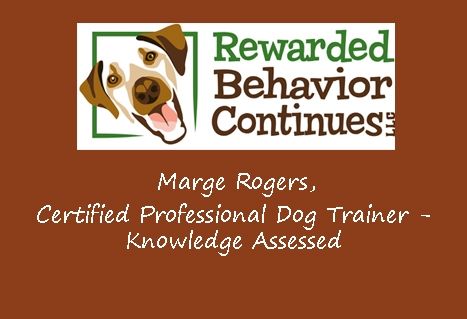
Visit the "Puppies" page at Rewarded Behavior Continues for more information.

